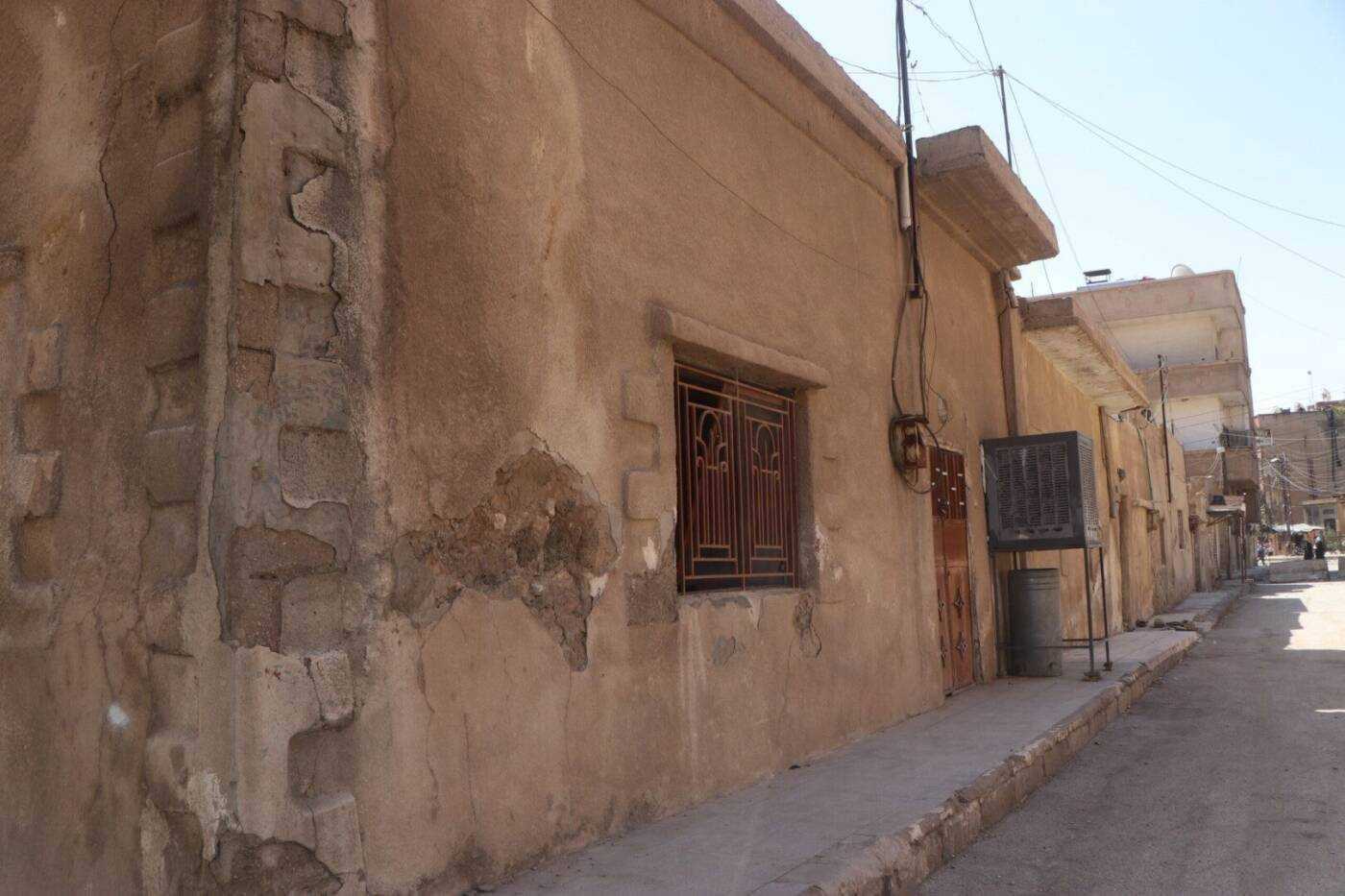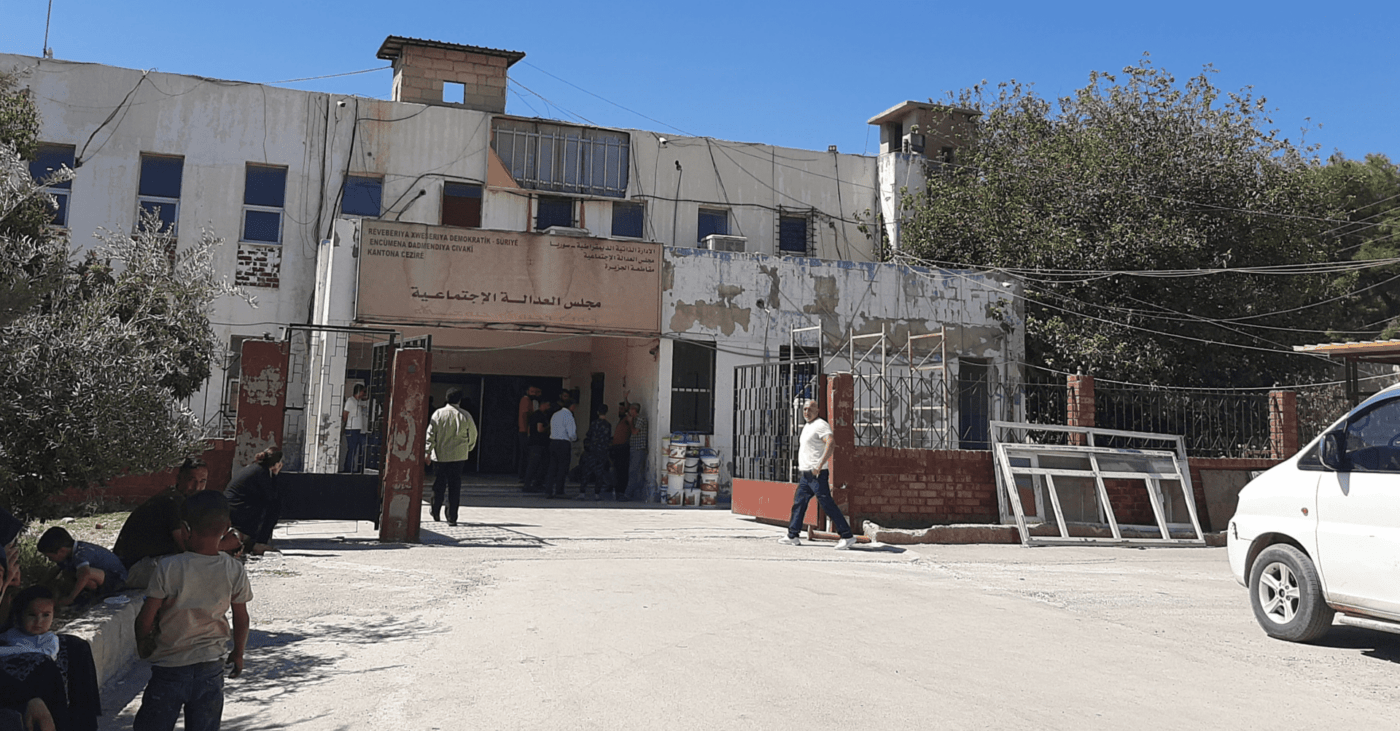Patriarchy stronger than law: ‘Honor’ killings persist in northeastern Syria
Despite harsh penalties and community efforts to combat so-called “honor killings” in northeastern Syria, women continue to be murdered. How can potential victims be protected, before it is too late?
26 October 2023
HASAKAH — Sitting with family members in her kitchen, the scene of her daughter’s murder, Najah Mustafa’s sorrow was plain on her face. Beside her sat her daughter-in-law, the wife of the killer: her own son. Her husband, Dhiab al-Nazal, was composed as he recounted the details of the tragedy at their home in the al-Aziziya neighborhood of Syria’s northeastern Hasakah city.
On August 10, at half past five in the afternoon, 28-year-old Nagham Dhiab al-Nazzal was in the kitchen cooking a meal for her father. Dhiab was outside, relaxing in the courtyard, when Nagham’s 40-year-old brother Salem killed her and “fled to Iraq,” the father said.
Dhiab said his son “didn’t mean to kill his sister—he just had way too much to drink that day.” But Najah, who was away from home in Damascus being treated for a stroke when her daughter was murdered, had a different story to tell.
Najah said her son murdered his sister after he heard the neighbors call her “dirty” and accused her of “using drugs.” Neighbors and relatives had spoken badly of Nagham “and asked us to kill her,” she said. “He washed his shame, he killed her,” she said. “My daughter is free of people’s talk. It’s better she’s gone,” she added, in a voice full of grief.
In the first half of 2023, 25 women were killed in northeastern Syria, including in crimes committed under the pretext of honor, according to figures from the Women’s Coordinators in the Autonomous Administration of North and East Syria (AANES)—a collective of women working within AANES and its feminist organizations and institutions. However, this number is likely an undercount, as some families cover up such crimes due to their fear of “shame,” several local sources told Syria Direct.
Killings persist
In the second half of the year so far, Syria Direct has tracked the murders of five additional women in northeastern Syria, including Nagham.
On September 3, 2023, an 18-year-old girl lost her life at the Serekaniye displacement camp in Syria’s northeastern Hasakah province. “The coroner’s preliminary report points to it being a case of murder and investigations into the circumstances of this incident are still ongoing,” the AANES’ Social Justice Office in Hasakah told Syria Direct.
In August, just days before Nagham’s killing, the Internal Security Forces (Asayish) found the lifeless body of Hiba Mahmoud al-Khalaf, 32, in her home in Hasakah, after she was killed “by her husband,” Hiba’s father told Syria Direct.
And on July 12, in the Qamishli countryside town of al-Qahtaniya (Tirbespiye), two sisters, aged 16 and 18, were killed “by their stepmother,” a source close to the family told Syria Direct. The source denied the accused’s claim that the sisters died from an accidental electric shock.
The source’s account aligns with the information provided by Sara—an organization in northeastern Syria dedicated to combating violence and discrimination against women. “The coroner’s report confirmed that the two sisters were suffocated. The father, his wife and brother all knew about the crime and they are currently detained pending further investigation,” the organization told Syria Direct.
Recurring crimes against women in northeastern Syria raise questions about how potential victims can be protected before it is too late, as well as the role of the AANES and local organizations in reducing these killings.
“Under no circumstances should women be killed, no matter their sin,” Hiba’s father told Syria Direct, anticipating that his “daughter’s murderer will be severely punished by the Hasakah court.”

The neighborhood of Hasakah city where Hiba al-Khalaf was killed by her husband in August in a crime committed under the pretext of honor, 24/8/2023 (Sozdar Muhammad/Syria Direct)
In his small food shop last month, Hiba’s father recounted the story of his daughter’s murder. He had not heard from her for several days when “neighbors alerted me to a foul smell coming from her house. I then contacted the Internal Security Forces to help open the door of her house. When they did, I found her wrapped in a thick carpet.”
The coroner’s report indicated that “my daughter was killed by her husband, who struck her on the head with a heavy object, and then fled with his two children. The Internal Security Forces arrested him at the Tabqa checkpoint,” in Raqqa, a province east of Hasakah, the father said. He added that Hiba’s husband “planned to escape to the regime-held al-Safira area of the Aleppo countryside.”
The judiciary’s stance
Since the start of 2023, two people have been sentenced to life for the premeditated murder of women in northeastern Syria, according to the Hasakah Social Justice Office. Meanwhile, other similar cases are still under consideration in the courts, with their verdicts pending.
Syria Direct, in collaboration with Sara Organization, attempted to investigate the status of outstanding cases related to murders of women in northeastern Syria, but was not able to access further details due to the trials’ confidentiality.
“It may take years to reach a verdict in some cases. Some women were killed years ago, and no verdict has been issued yet,” the Hasakah Social Justice Office said, which was confirmed by Sara.
Generally, “the sentence for those convicted of murder ranges from 10 years to life in prison, depending on whether the crime was premeditated or unintentional,” lawyer Walat Muslim from the Hasakah Public Prosecution Office told Syria Direct.
Article 213 of the AANES Penal Code, issued in 2018 and amended in 2023, stipulates “aggravated life imprisonment for premeditated (intentional) murder in the following cases: when committed against one of the perpetrator’s ascendants or descendants, spouses or siblings; when the murder is associated with another felony or misdemeanor; [and] when the perpetrator engages in acts of torture or brutality.” However, the penalty is reduced to 15 years “if personal right is waived” by relatives of the victim.
Article 214 of the same code, a copy of which was provided to Syria Direct by Muslim from the Hasakah Prosecution Office, stipulates that the general sentence for intentional murder is 10-20 years. The penalty may be increased to life imprisonment if the killing is committed “for a base reason,” or in the context of facilitating the commission of a crime or assisting those involved in criminal activities. Life imprisonment may also be imposed if the victim is a public worker carrying out official duties, a child under the age of 15 or if the crime involves multiple victims. A life sentence may also be reduced to 10 years, and sentences of 10-20 years may be reduced by half, if personal rights are waived.
A crisis of customs or law?
In 2022, Sara documented 38 killings of women in northeastern Syria, according to the organization’s spokeswoman Aarzou Tammou, who expressed concerns about a potential increase in the number of victims this year.
Syrians for Truth and Justice (STJ), in collaboration with the Musawah and Sara organizations, documented about 185 “honor” killings against women and girls across Syria between the start of 2019 and November 2022, in addition to “20 domestic violence homicides.”
“Honor” killings persist in northeastern Syria though AANES classifies them as full-fledged crimes, enforcing penalties as outlined in its penal code and eliminating any legal justifications for committing them.
Tammou attributed these crimes to “local traditions, tribal beliefs and the prevalent view of women as guardians of family honor in a region governed by a patriarchal mindset,” adding that “drugs are also a major factor in these murders.”
“Enacting laws alone is not enough,” journalist and human rights activist Avin Youssef said. While the AANES has laws on the books with harsher penalties for family killings, “they have not limited or prevented the killing of women so far,” she told Syria Direct. “Communities and rural areas have a clan nature, and still adhere to customs and traditions that consider women inferior to men, while men have incentives for subjugation and oppression,” she said.
Jano Shaker, another journalist and human rights activist, agreed. “Crimes like these are primarily due to the exploitation and doctoring of some religious texts, with the aim of excluding women from practicing their natural role in society, until [these crimes] became acceptable in social custom over time,” he said.
Some crimes accepted under clan and tribal customs also had a formal “legal justification until 2020, as the perpetrator’s sentence for crimes [committed] under the pretext of honor was reduced” in the Syrian Penal Code, Shaker added. “The existence of laws in northern and eastern Syria that unequivocally criminalize this phenomenon is an important development in the context of justice for women and their equality with men.”
However, “the existence of deterrent laws is not enough,” he said. “We are a society in a state of war, and laws are often applied unevenly and selectively, especially in northeastern Syria.”
STJ’s 2022 report on so-called “honor killings” indicated that “chaos, the absence of the rule of law, and the spread of weapons, in addition to the normalization of [gender-based violence] GBV, contribute to the high rate of ‘honor killing’ in Syria,” which “increased with the escalation of the Syrian conflict.”
Facing this dark reality, Tammou emphasized the importance of “educating society, to eradicate violence and discrimination against women, which reduces these crimes.” This includes raising awareness about family law and the legal penalties for murder, she said.
“Some people are not aware of AANES’ laws and believe that the penalties for honor killings are the same as those under Syrian law,” Tammou said, referring to Article 548 of the Syrian Penal Code. Article 548, which was abolished in 2020, granted a mitigating excuse and reduced penalties for “honor killings.”
In AANES-ruled northeastern Syria, “the penalties cannot be tightened any more,” Rima Barakat, co-chair of the Social Justice Council, told Syria Direct. “The constitution of northeastern Syria prohibits the death penalty, and life imprisonment is the most severe punishment.”
She also underscored the importance of “educating society to prevent these crimes, conducting awareness campaigns that will advance society and change its mindset,” in addition to integrating awareness into educational curricula. “The solution requires long-term plans, so raising awareness is more important than the legal aspect.”
Nazdar Mala Darwish, the executive director of Taa Marbouta, a women’s organization in northeastern Syria, outlined the multi-pronged approach required to combat the killing of women, stressing “the process requires collaborative efforts at several levels.”
On the legal front, “murder penalties must be intensified,” Darwish said. On the awareness front, she stressed the need to “educate society about the importance of gender equality and respect for women’s rights,” as well as “strengthening and empowering women economically and socially, providing them with a safe and equitable environment.”
“The murders of women are stark violations of human rights that reflect blatant gender-based disparities and discrimination against women,” Darwish said.
Taa Marbouta runs advocacy campaigns through the media on issues related to women, as well as organizing in-person “sessions on hate speech against women, gender-based violence and advocacy for women’s inheritance rights,” she said. It also works to “build girls’ capacity to join the workforce.”
But while local organizations work to advocate for women and reduce killings committed under the pretext of honor, it remains to be seen whether their efforts will bear fruit as murders continue.
Nagham Dhiab’s mother, Najah, is not waiting for justice from the courts, and she does not want her son to be put on trial for her daughter’s murder. Sitting in her home in Hasakah last month, Najah repeated one phrase again and again: “I forgive him.”
**
This report was produced as part of the second phase of Syria Direct’s MIRAS Training Program, in coordination with Taa Marbouta. It was originally published in Arabic and translated into English by Nouhaila Aguergour.







